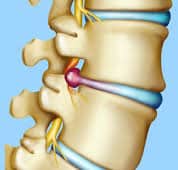Herniated discs are a common cause of chronic back pain. The disc material presses on the spinal nerve and can be difficult to diagnose and treat without proper imaging. The first sign of a herniated disc is often pain in the back or neck that radiates down one or both legs. Herniated discs can also produce numbness, tingling, and weakness in one or both legs.
You may have noticed that your herniated disc symptoms are most pronounced in the morning, then slowly become less intense as the day goes on. The reason is relatively straightforward: remaining in one position for an extended period of time (as you typically do overnight) can allow the muscles in your neck and back to stiffen.
It’s similar to waking up with a stiff neck after sleeping with your neck positioned at an odd angle — the pain can be significant at first, but usually goes away after a bit of stretching and movement. The more you get up and move around, the more flexible and limber your body will become.
 With a herniated disc, though, there may be another issue at play: a nerve or nerve root that’s been compressed by the herniated disc for hours, days or even weeks or months. This can make the nerve extremely sensitive. Over the long run, it can reduce your range of motion, cause you chronic pain and even lead to numbness or muscle weakness in your extremities.
With a herniated disc, though, there may be another issue at play: a nerve or nerve root that’s been compressed by the herniated disc for hours, days or even weeks or months. This can make the nerve extremely sensitive. Over the long run, it can reduce your range of motion, cause you chronic pain and even lead to numbness or muscle weakness in your extremities.
There are some less known factors that may contribute to the worsening morning pain phenomenon. For example, the discs have been compressed all day and as a result, they become less hydrated as the day progresses. The discs are also more prone to injury when they are dehydrated.
How to relieve your herniated disc symptoms
There are quite a few ways to relieve the symptoms of a herniated disc such as medications and hot/cold therapy, but these treatments will normally offer temporary relief. The best approach is to talk with your physician about finding an effective combination of conservative treatments, as well as any potential activity modifications that might help. For instance, you might try getting out of bed slowly and avoiding strenuous activities first thing in the morning. If your symptoms or pain escalate to the point that they start to interfere with your normal activities, you might consider other treatment options or even surgery to address the herniated disc itself.
If you are still affected by the symptoms of a herniated disc after conservation treatments, request a consultation with a member of our spine team at Spine & Orthopedic Center today at 888-409-8006 to go over other alternatives.







Leave A Comment